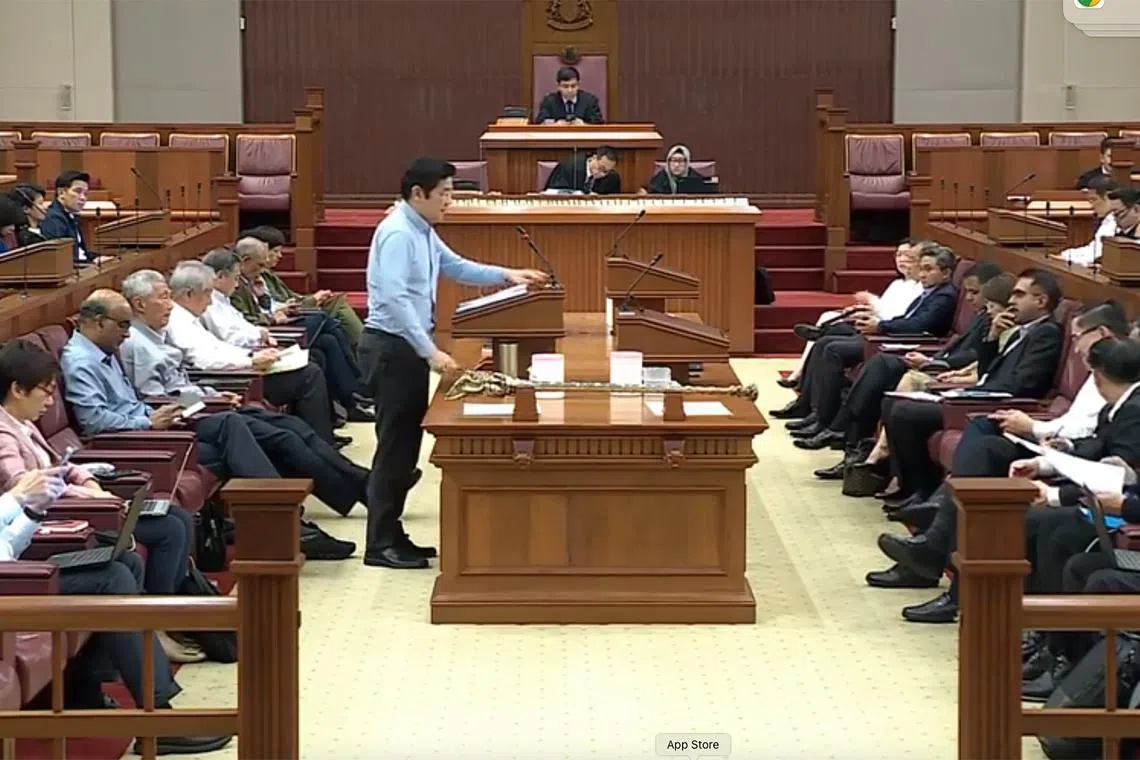DPM Wong calls on opposition to offer ‘serious alternative agenda’, not just populist ideas
Sign up now: Get ST's newsletters delivered to your inbox

As Singapore develops into a mature democracy, it needs both a serious government and also a serious opposition that thinks carefully about what it will do as government, said Deputy Prime Minister Lawrence Wong.
PHOTO: MCI
SINGAPORE - Instead of putting forth opportunistic or populist ideas that chip away at trust in the Government, offer a serious alternative agenda and be upfront about the trade-offs.
This was the challenge Deputy Prime Minister Lawrence Wong issued on Monday to the opposition, and the Workers’ Party (WP) in particular, as Parliament resumed following its midterm recess.
As Singapore develops into a mature democracy, it needs both a serious government and also a serious opposition that thinks carefully about what it will do as government, said DPM Wong.
“That’s how politics in a First World Parliament should work,” he said – an allusion to the WP’s 2011 election slogan of “Towards a First World Parliament”.
Mr Wong said the WP broadly agrees with and supports the People’s Action Party (PAP) government’s policy direction, but wants it to do more in certain areas.
“But there is a fundamental difference: When we plan to spend more, the PAP government will always tell you plainly how we propose to raise revenues and ensure that our Budget remains balanced over the medium term,” he said.
“The opposition has offered some revenue alternatives, but their sums do not add up.”
For instance, the WP does not support the entire goods and services tax
“None of the alternatives that the WP has suggested will make up for the shortfall,” he said.
Mr Wong, who is also Finance Minister, said people have asked whether shifts to Singapore’s social compact means the PAP’s fourth-generation team has moved to the left.
The Government’s approach is not easily characterised along the traditional left-right political spectrum, as it does not blindly copy the models of other countries, he said.
Even the first generation of PAP leaders, who started out as democratic socialists, spoke of a socialism that works as they did not want any part of what they knew was failing elsewhere, he added.
Singapore will do more to strengthen its social safety nets, but it will not adopt a model of comprehensive universal welfare as practised in continental Europe and the Nordic countries, Mr Wong said.
These countries have much higher levels of state-financed welfare, but impose high income tax for the middle class of more than 30 per cent, and GST in the range of 20 per cent to 25 per cent to fund such spending, he noted.
These governments typically spend above 40 per cent of gross domestic product, compared with Singapore’s 18 per cent.
Conversely, the overall tax burden for the middle-income group here is now far lower than in other advanced nations, and the Government will strive to keep it this way while ensuring that its programmes achieve better outcomes, he said.
“While we will indeed do more to strengthen social safety nets, we will move with prudence and discipline, and not end up inflicting heavy tax burdens on everyone,” he added.
Singapore is also one of the few advanced countries where the broad middle has seen large increases in income over the past 20 years, said Mr Wong.
Income for this group is today higher than in the United States and most European countries, and well above advanced Asian societies such as Japan, Hong Kong and South Korea, he noted.
This is why economic growth is non-negotiable even as Singapore’s labour force expands more slowly, he said. “If we don’t grow the economic pie, there will be fewer jobs and less scope for social support.”
He added: “This government will, and must, always be pro-growth and pro-inclusivity. Securing our economic competitiveness will become more, not less, important in the next phase of Singapore.”
While his team will work to create good jobs and sustain real income growth, Mr Wong said he does not assume the PAP will win the next election, or that it is inevitable that he takes over as prime minister – a point he had made previously.
Therefore, he hopes that the opposition will make concrete proposals over the course of the five-day debate on the President’s Address, as well as for the remaining term of government.
“Where the opposition have good ideas, or where they can make a contribution to the ideas for improving our country, we welcome them,” Mr Wong said.
“But we ask that you be upfront about the realities and trade-offs we face as a nation, and be honest about your plans, policies and intentions.”



